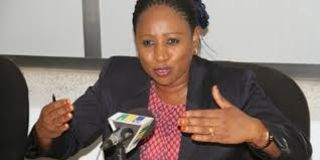Why govt cut the health budget—minister explains

Dodoma. Health, Community Development, Gender, Elderly and Children minister Ummy Mwalimu on Friday April 20 told the parliament that her docket’s budget estimates for 2018/19 financial year were cut down following the criticisms that were raised by a section of lawmakers.
The minister revealed this when responding to queries raised by members of parliament about the Sh898.3 billion budget proposals she tabled in the National Assembly in Dodoma on Thursday.
She asked the MPs to endorse the budget which is lower than the Sh1.1trillion that was previously passed for the current (2017/18) financial year, ending June 30th.
Ms Mwalimu responded saying, “When I tabled the Sh1.1trillion budget last year, members of parliament challenged me that it was too high and unrealistic. So, this year, we have decided to lower it.”
However, she noted, “Domestic funding has increased from Sh628 billion in the current fiscal year to Sh681billion proposed for next financial year. But we have reduced foreign funding [she didn’t mention figures]. We want to assess ourselves as a county on what we can do in situations when donors walk out.”
The Social Services Parliamentary Committee revealed that in the current budget, of all the Sh1.1 trillion disbursed to the ministry, 49 percent had been spent on development projects, where, 19 percent of development funds came from domestic sources and 71 percent from donors.
Last year, when she tabbed the Sh1.1trillion budget, lawmakers and health advocacy organizations raised concerns that it was “unrealistic” and was not practical.
In an interview with The Citizen last year, the Executive Director of Sikika, a health advocacy NGO, Mr Irenei Kiria, explained that he (and the Sikika team) had not found the basis to explain why the government decided to increase the health sector budget to such an “unprecedented” amount ( of Sh1.1trillion).
“In this proposed health budget, the government is still promising the same thing that have not yet been implemented as per proposals in the past fiscal year,’’ said Mr Kiria as quoted by The Citizen.
On Thursday April 19, the Social Services Parliamentary Committee, led by Mr Peter Serukamba tabled a report in parliament showing that the ministry had also failed to meet the targets for the 2017/18 financial year.
The Committee chairman, Mr Serukamba said that only 57 percent of the Sh1.1trilloin for the current financial year, had been disbursed to the ministry by the end of February this year.
The committee further raised concerns that the proposals for the 2018/19 were also inadequate, as per the benchmarks set by the Abuja Declaration, where African countries committed themselves to allocate 15 percent of the national budget to the health sector.
The minister said that the Abuja Declaration “is not binding the country to raise the health budget to 15 per cent.” “It’s only one country, that I know, which has been able to attain that budget,’’ she noted.
The parliament has passed the health budget for the next financial year, as proposed by the minister; in which over Sh304.5 billon would be recurrent budget, over Sh88.5 on other expenditures, and over Sh216 on salaries for the civil servants.
She said that over Sh561.8 billion would be spent on development projects; whereby Sh185 billion would be collected from domestic sources while Sh376.8 billion would be obtained from donors and development partners.
The budget for Community Development, Gender, Elderly and Children would be Sh32.14 billion, she said. This forms a total health sector budget of Sh898.3 billion.




